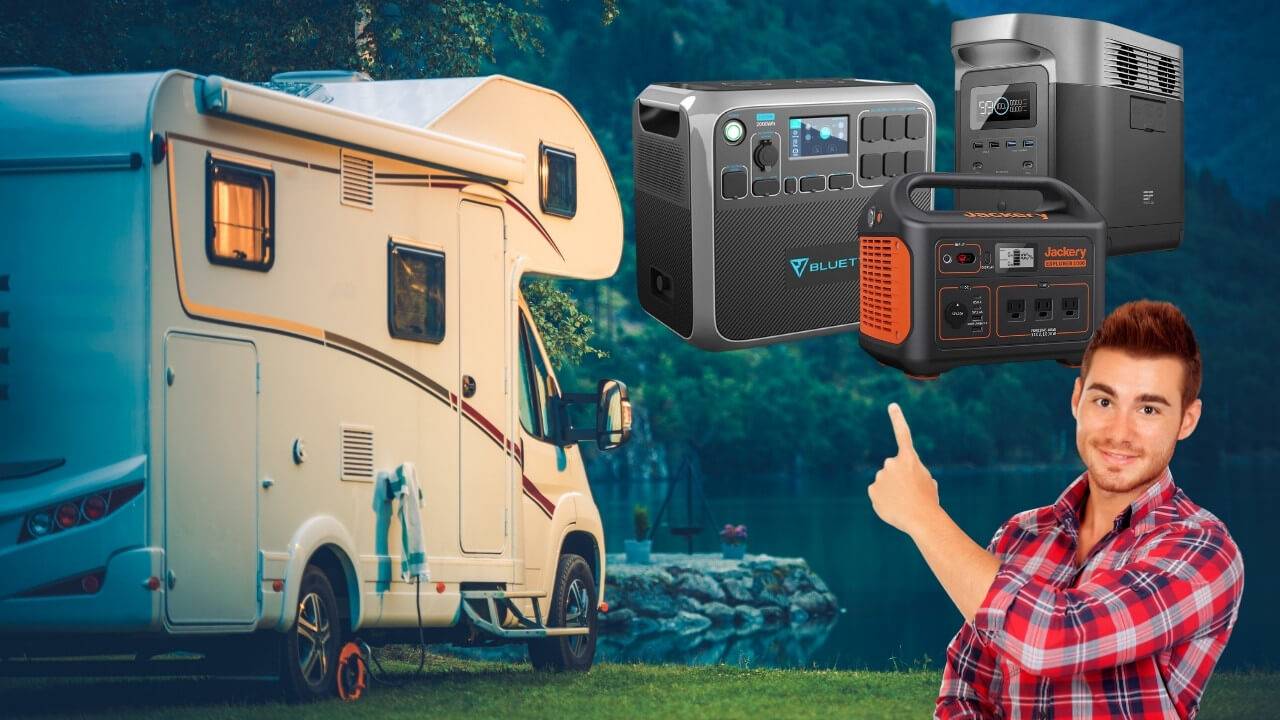Going solar in your RV sounds simple — until you’re faced with battery jargon, surge ratings, plug types, and solar panel placement. If you’ve ever found yourself Googling “Why doesn’t my solar generator plug into my RV?” or “Can I run an AC on solar?”, you’re in the right place.
This guide breaks down everything you need to know about choosing and using the right solar generator for RV life — from understanding battery chemistry (Li-ion vs. LiFePO4) to figuring out how many panels you need for boondocking. We also help you weigh full DIY solar kits against plug-and-play solar generators, so you can power your adventures with confidence.
Plus, we go beyond specs and wattage to explore the sustainability and ethics behind leading solar generator brands like BLUETTI, Jackery, EcoFlow, and Goal Zero. Because when you’re living off-grid, it matters how your power is made — and who’s making it.
Whether you’re a weekend camper or a full-time nomad, this blog is your roadmap to clean, quiet, and reliable RV power — minus the guesswork.
How to Choose the Right Solar Generators for RV Setup
How to Choose an RV Solar Generator Battery
The most important feature of every battery in a solar generator for RV is the capacity. The capacity tells you how long you can power your appliances without having to charge the battery.
Battery capacity is measured in watt-hours (Wh) so for example, a solar generator with a 2,000Wh battery can power an 800W microwave for 2 hours, a 60W laptop for 30 hours, etc.
To choose a generator with an optimal battery for your needs, check the power ratings on the devices you plan to use in your RV at the same time.
For example:
Fridge (150W) + TV (110W) = 260W
2,000Wh / 260W = 7.7h
You can run a fridge and TV for more than 7 hours with a 2,000Wh battery.
Lithium Ion (Li-ion) vs. Lithium Iron Phosphate (LiFePO4) Batteries
The best portable solar generators today use lithium batteries. They are lightweight and you can discharge them up to 80-90% without them losing capacity over time.
However, there are two lithium battery types: lithium-ion (Li-ion) and lithium iron (Li-iron).
Both types are more efficient than lead-acid types, so you can’t go wrong with any.
Li-ion batteries will help you keep the weight down, and generally cost less.
Li-iron batteries (such as those used by Bluetti) are heavier but have between 3,000 and 5,000 life cycles, which means they’ll last for decades.
The battery life cycle tells you how many times you can discharge and recharge the battery so that its capacity is still above 80%.
Rated Output VS. Surge Output
The rated output is the wattage your solar generator for RV can continually deliver until the battery is empty.
This number is important because it tells me how many devices (based on wattage) I can plug at the same time.
For example, the 1000W Jackery solar generator can power —
- Coffee maker (550W)
- Mini fridge (60W)
- TV (60W)
And at the same time, there’s still plenty of power left for me to charge my laptop, phone, camera, etc.
The surge output tells you what wattage the generator can provide to start up appliances that need more power to start running.
You can “override” the surge output by using a soft start device that lets you start up bigger appliances with less surge power. These devices are cheap and easy-to-use.
Why is Solar Input Important?
The solar input tells you how much power the generator can take through solar charging.
For example, the Bluetti AC200P has a solar input of 700W. This means if you connect 7x100W solar panels, in good sunlight, the 2,000Wh battery will recharge in 3-4 hours.
So the higher the input the faster the charging time.
Of course, this kind of efficiency wouldn’t be possible without the MPPT (Multiple Power Point Tracking) controllers.
This device smoothens the voltage difference between an undercharged battery and solar panels. As a result, almost all the solar energy goes into the battery.
Most modern solar generators for RV have built-in MPPT controllers, but make sure to read the specs first.
Size Does Matter!
While all of the solar generators reviewed here are marketed as portable, this isn’t much of an issue with RV use.
Of course, you need to take size into account as Bluetti EP500 will take significantly more space than other options.
In my experience, the arrangement of input and output ports is much more important. I personally like to be able to see all the plugs coming in and out of the unit.
If all the outlets are on one side, I find it easier to place the generator somewhere out of the way. It helps with managing all the connectors, too.
You definitely want a solar generator for RV that supports all three modes of charging — from the AC grid, 12V car outlet, and of course, solar charging.
Choose one with at least three 110V AC outlets, as these will be your main power points. USB ports and a car-type 12V DC outlet are nice to have for charging your gadgets. This way three-pronged outlets are free for more serious appliances.
RV Solar Generator Setup: Must-Know Tips and Troubleshooting
Help, My Solar Generator Doesn’t Have an RV Plug!
RVs have a large, heavy-duty three-prong 30 amp plug. It may look like a standard home 110/120V plug, but it’s not.
Most campgrounds you visit will provide you with a 30 amp outlet so you can plug your RV power cord directly into the grid.
But if you want to fit your RV with a solar generator, it would be nice that the unit itself comes with a 30 amp RV outlet. This way you can use your trailer’s own outlets without running countless extension cords.
The Zero Point Energy Titan is the only solar generator with a 30 amp RV outlet on this list.
But if your solar generator doesn’t have one, don’t worry. Plug this 30 amp RV adapter in one of the AC ports and you’re all set.
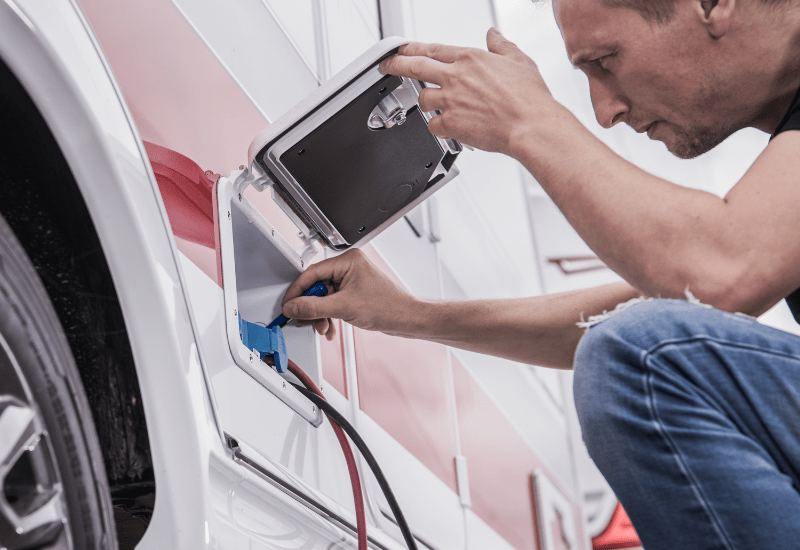
Can I Run Air Conditioners Using My RV Solar Generator?
Yes, you can. With the right setup.
However, running an RV air conditioner might be challenging. First of all, A/C units are real energy hogs — they need lots of power both to start and keep running. An average RV air conditioner needs about 1,800 watts to start up and 650 watts to keep your trailer cool.
This means if you want to run the AC overnight, you need a battery bank of at least 700Ah.
The next challenge is the whole nature of solar power — solar panels work best in direct sunlight, while your RV is more likely to stay cool in the shade.
So, for an average RV air conditioner of around 13,000 BTUs, you need a minimum of 1,500 watts of solar power. If your vehicle roof can take 15x100W solar panels, I’d say your problem is solved.
If you’re not sure about your air conditioner wattage, take the number of BTUs and divide it by 10. So, a 13,000 BTU A/C unit uses roughly about 1,300 watts of power.
How Many Solar Panels Do I Need for Boondocking?
It depends on the number of batteries you need to charge and what appliances you want to power.
Basically, you need to add up the amp hours (Ah) of your batteries on one side and the wattage requirements of your appliances on the other.
So if your kit has a single 12V battery at 100Ah, you should have a minimum of 3x100W solar panels. With two 12V batteries at 200-250Ah, you need at least 4x100W solar panels or 2x200W solar panels.
The formula says you can get 30Ah of battery charge with a 100W solar panel and 5-9 hours of sun exposure.
For example, if you want to run only basic RV essentials, 300 watts of solar panels would be enough. These include LED lights, ceiling fans, refrigerators, and water heaters, along with a few electronics.
If you want to add a 1,000-watt microwave to the bunch, add another battery and mount a minimum of 400 watts of solar.
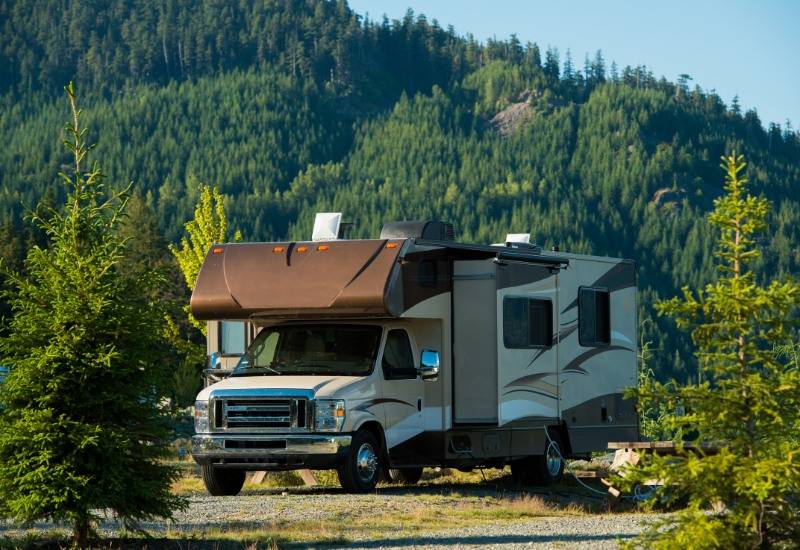
Where Should I Place the Solar Panels on RV?
In an ideal scenario, all your solar panels will fit on your RV roof. This is definitely the most elegant solution — just park it in the sunlight and hook them to the battery. You can even charge as you go.
But if you don’t have enough roof space, would you place them on the ground?
Of course not.
Try going for a DIY a portable solar panel stand, just like the one in the video below
I use flexible solar panels and the whole setup is so light that I can move it easily around for the best sun exposure.
But there is an added benefit to using a ground stand. A 100-watt panel will deliver only between 50-75 watts on the RV roof.
Why?
Because if you stick them to the roof, you can tilt them to face the sun at the ideal 90-degree angle. Also, roof panels are more difficult to keep clean of tree sap and debris for maximum efficiency.
Still, even with the power penalty, roof panels seem to be more popular.
You don’t have to set them up every time and there’s no risk of the wind kicking them over.
Should I Use an RV Soft Start Device?
Yes, you definitely should make an RV Soft Start Device a part of your solar generator kit. Remember how those A/C units and larger appliances need a lot of power to start?
A soft start device allows you to start large devices with a smaller solar generator.
With a soft starter device like this EasyStart Micro-Air, I can start my RV air conditioner with several appliances running at the same time.
Just keep in mind that a soft start device won’t bring down the continuous running wattage — it only helps with the initial power surge.
Which Battery Is Best for My RV?
Lead-acid or AGM batteries use proven and time-tested technology that is less expensive than lithium counterparts. However, AGM batteries are more sensitive to the depth of discharge.
This means the deeper you discharge the battery, the fewer life cycles it has. That’s why manufacturers generally recommend discharging lead-acid batteries to only 50% of their capacity.
That sucks!
With lithium batteries, on the other hand, you don’t have to worry about the depth of discharge. As a result, you can get the desired capacity with fewer batteries.
So, a lead-acid battery might be a better choice if you use your RV only for vacationing, while a lithium battery is better for off-grid living.
And yet, with lithium batteries, there are significant differences between the two popular technologies — lithium-ion and lithium-iron.
Li-ion batteries have a higher energy density. This makes them a better choice for power-hungry electronics that drain batteries at a high rate.
Li-iron batteries, on the other hand, have much more stable discharge rates. This means that they don’t degrade significantly as their capacity drops.
Lithium-ion batteries generally weigh less, but lithium-iron technology is safer to use in hot environments because it’s incombustible.
If you’re not going to move your battery bank a lot, I recommend you go with lithium iron.
How to Choose Solar Panels for RV
If you’re going to set up panels on your RV “as needed,” you should go with flexible solar panels, as they are easy to move and store away. If you’re having them mounted permanently, go with rigid-frame solar panels, as they are generally more cost-efficient.
And what about the wattage?
100W solar panels are what you should look for. One 200W panel takes the same amount of space as two 100W panels. While you won’t save any space, two panels are easier to manage and mount. More importantly, smaller panels won’t catch the wind so easily.
When it comes to solar panel technologies, there are differences between thin film, polycrystalline, and monocrystalline panels.
- Thin Film — The cheapest option but also the least effective (6-10%). Needs a bigger area of coverage to achieve the same output.
- Polycrystalline panels — More efficient (16%) than thin-film and less expensive than monocrystalline panels. They operate less efficiently in high temperatures.
- Monocrystalline panels — The most expensive option but provide the highest efficiency of 20% and longest service life.
Solar Generators vs DIY Solar Kit: Which Path is Right for You?
Outright, installing an RV solar generator kit is much easier than building a 100% DIY RV solar system from scratch.
To do the whole thing yourself, you need to understand volts, amps, watts, and how they work together for maximum efficiency. And there’s also the matter of safety.
The last thing you need is faulty wiring that can start a fire in your trailer down the road.
However, people have done it and are still doing it. Going DIY allows you to tailor the system to your needs, as you get to choose things like the battery, inverter, connectors, etc.
You still have to know what you’re doing and what works and what doesn’t. If you go this path, I recommend you enlist help from a professional electrician.
If you don’t want to experiment, you can simply get a solar generator for RV. These units have all the elements already inside — the inverter, charge controller, plugs, fuses, and batteries.
Plus, you get a full warranty for the whole package.
The best thing is that today you don’t need to build a custom RV solar system.
You can choose between many quality products with different properties and find one that best matches your needs.
And if you’re still not sure which solar generator for RV is best for you, keep on reading.
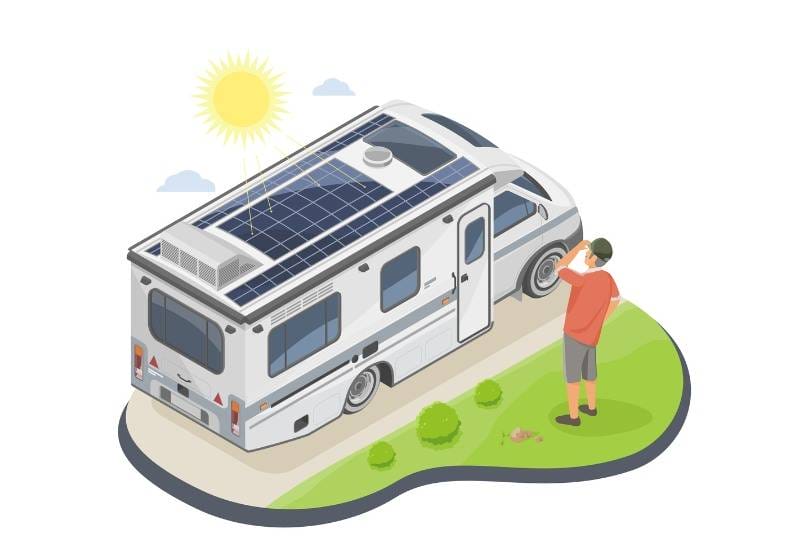
4 Top Sustainable Brands for Solar Generators (RV Use Case)
1. BLUETTI
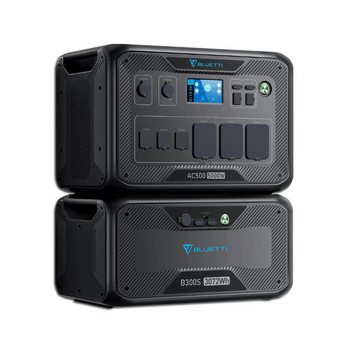
BLUETTI has carved out a strong reputation in the solar generator market by doing one thing exceptionally well: building systems that last. For RV travelers looking to stay off-grid without racking up environmental costs, BLUETTI’s approach to durability, modularity, and clean energy performance hits all the right marks.
At the heart of their top-tier solar generators is lithium iron phosphate (LiFePO4) battery technology. Unlike traditional lithium-ion batteries, LiFePO4 is non-toxic, thermally stable, and designed for extended use — often delivering over 3,000 charge cycles with minimal degradation. That’s a decade or more of consistent power output, reducing the need for early replacements and minimizing landfill-bound e-waste.
BLUETTI also champions open energy architecture. Their generators work with third-party solar panels, a rare nod to interoperability in an industry often built on proprietary systems. Their modular designs — like pairing the AC300 with external B300 battery packs — let users scale their systems over time, which not only supports growing power needs but avoids the environmental footprint of buying an entirely new unit.
Performance-wise, BLUETTI units are RV-ready. They feature high-capacity solar input, ultra-fast MPPT charging, and pure sine wave inverters that keep sensitive devices safe on the road.
While BLUETTI could strengthen its sustainability profile by offering a recycling or take-back program, the brand already leads by building products that don’t need replacing anytime soon. For eco-conscious RVers, BLUETTI delivers quiet, clean power without compromise.
2. Jackery
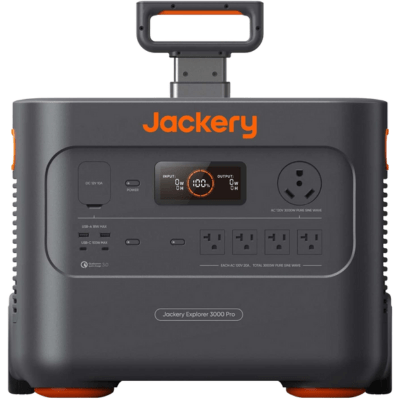
Jackery has become a household name among RV enthusiasts and vanlifers — and it’s easy to see why. Known for their compact design, user-friendly interfaces, and reliable performance, Jackery’s solar generators are built with mobile lifestyles in mind. But under the hood, there’s more than just convenience — there’s a growing commitment to sustainability.
Founded by a former Apple battery engineer, Jackery places a premium on clean energy access and portable solar innovation. Their product line, especially models like the Explorer 1000 and 2000 Pro, is tailored to meet the energy needs of campers and RVers who want plug-and-play solar without bulky installation. Lightweight builds, integrated handles, and all-in-one functionality make them ideal for weekend trips or minimalist living.
On the sustainability front, Jackery uses high-efficiency MPPT charge controllers and pure sine wave inverters to reduce energy loss and extend the lifespan of both the generator and connected devices. Some models now feature longer-lasting lithium NMC cells, and while these aren’t as durable as LiFePO4, Jackery is gradually introducing more robust chemistries in response to consumer demand.
Jackery also offsets its carbon footprint through various environmental partnerships and reforestation programs. The brand has committed to planting thousands of trees through Earth Day campaigns and collaborates with environmental nonprofits to promote renewable energy education.
Although they don’t currently offer a product recycling or buy-back initiative, Jackery’s continued efforts in sustainability messaging, paired with their energy-efficient, RV-optimized designs, make them a smart choice for eco-conscious adventurers who prioritize portability and low-maintenance power.
3. EcoFlow
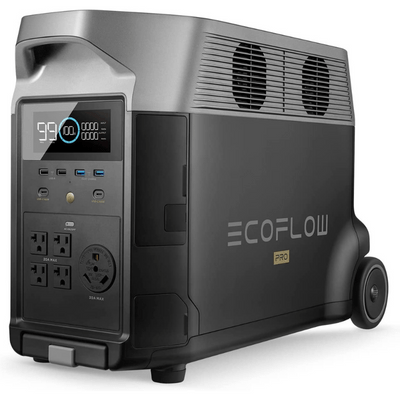
EcoFlow is quickly becoming a standout in the portable power scene — and it’s not just because their solar generators charge faster than most. For RVers seeking serious off-grid capability without compromising on eco-values, EcoFlow delivers a smart blend of efficiency, innovation, and environmental awareness.
EcoFlow’s signature X-Stream technology is a game changer. It allows their generators to charge from 0 to 80% in under an hour — meaning less time plugged into the grid and more time running on sunshine. Combine that with solar input rates exceeding 1,600W on models like the DELTA series, and you’ve got a solar generator that’s tailor-made for mobile setups.
Under the hood, EcoFlow is shifting toward LiFePO4 batteries for its higher-end models — offering better thermal stability, longer cycle life, and safer chemistry. That transition aligns with long-term sustainability, reducing the frequency of battery replacement and cutting down on waste. Their product design also leans into modularity and hybrid use — many models can double as backup systems at home or serve as core power hubs for RVs.
On the brand ethics front, EcoFlow is actively vocal about its green mission. They’ve launched eco-campaigns, supported environmental causes, and showcased transparent manufacturing improvements in recent years. While not all products are made with recyclable materials yet, EcoFlow is ramping up efforts in durability testing and lifecycle management.
For the RV crowd, EcoFlow units offer a sleek balance: fast solar charging for limited daylight hours, enough wattage for microwaves or electric coolers, and compact frames that store easily in small rigs. It’s an ideal match for digital nomads and vanlifers who want both speed and sustainability in a single box.
4. Goal Zero
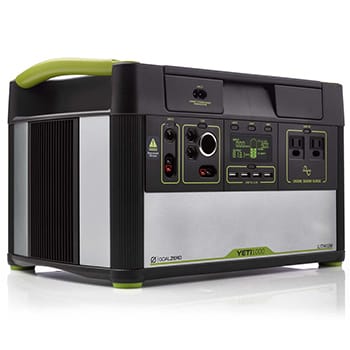
Goal Zero has long stood at the intersection of outdoor adventure and social impact. Founded with the vision of bringing power to underserved communities, the brand has evolved into a premium choice for RVers who want portable solar power systems that are rugged, reliable, and built with a conscience.
Their Yeti series — including the Yeti 1000X and 1500X — is purpose-built for off-grid use, offering expandable battery storage and integration with their proprietary Boulder and Nomad solar panels. While their plug-and-play ecosystem leans more proprietary than open, it’s optimized for seamless setup in RVs and campers, with mobile app support, pass-through charging, and regulated 12V outputs for powering fridges, fans, and lighting on the go.
Goal Zero doesn’t just make gear — they live their mission. The company is a certified B Corporation and part of the NRG family, backing projects that deliver clean energy to disaster zones and remote villages around the world. Their corporate sustainability report highlights efforts to reduce packaging waste, design longer-lasting products, and support local communities through responsible sourcing.
Battery-wise, Goal Zero has been gradually shifting toward longer-life lithium technologies, and their higher-capacity models are now LiFePO4-compatible through external tank add-ons. While not all base models feature this by default, their modular expansion options make it easier to build a low-waste system over time.
For eco-minded RVers who care as much about the “why” as the “watts,” Goal Zero stands out as a brand that backs up its clean energy promises with purpose-driven action and field-tested reliability.
Power Your Journey RV Solar Generator, Sustainably
Choosing a solar generator for your RV isn’t just about watts and volts — it’s about freedom, reliability, and reducing your environmental footprint. From LiFePO4 batteries that outlast traditional chemistries to brands like Goal Zero and BLUETTI building for longevity and modularity, your options have never been greener.
Whether you’re boondocking in the wild or cruising the open road, understanding solar input, battery type, surge ratings, and sizing can make or break your off-grid experience. And with so many ethical, eco-forward brands on the market, you can now power your RV with clean energy — without compromising on performance or sustainability.
Ready to find the perfect fit for your setup? Scroll back to explore our brand deep-dives, or bookmark this guide for your next adventure. The sun’s out — your power should be too.

